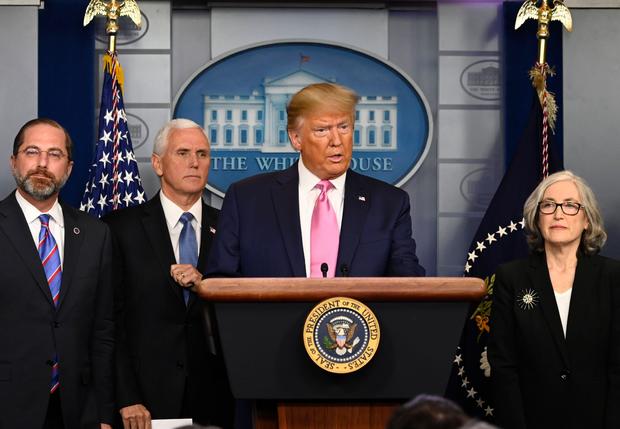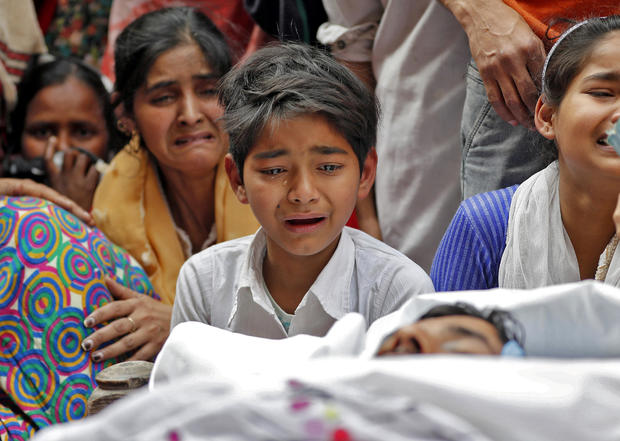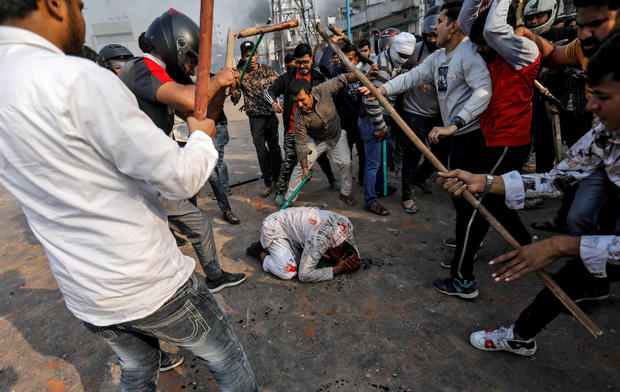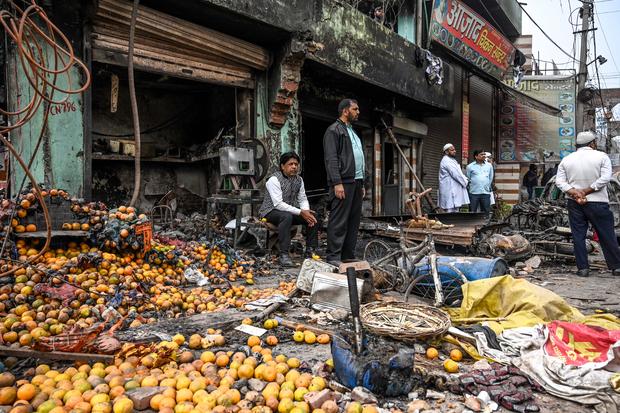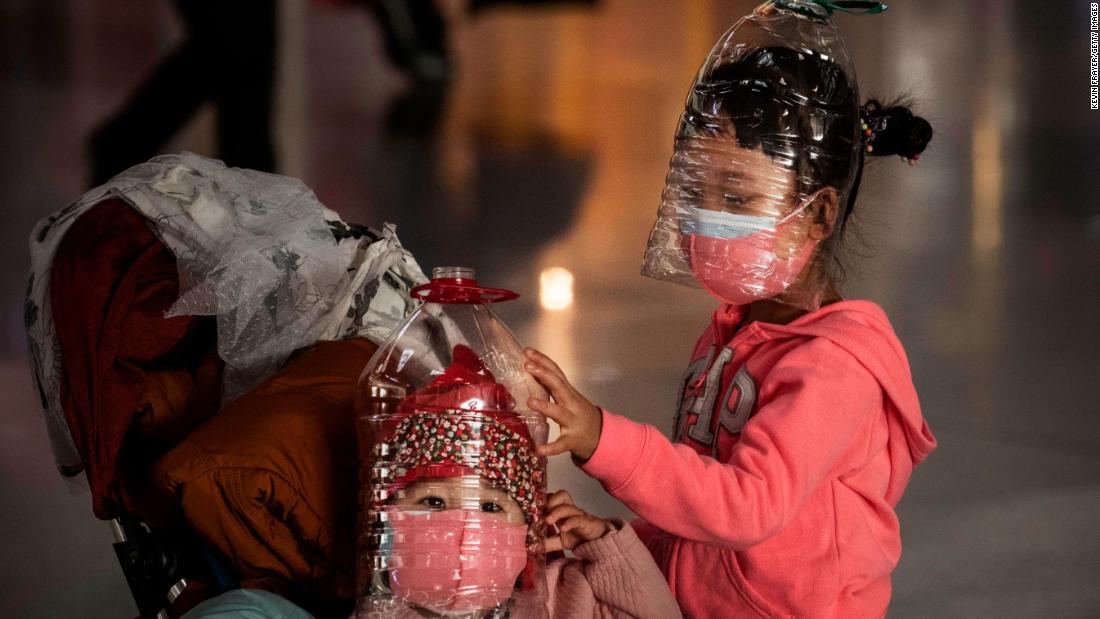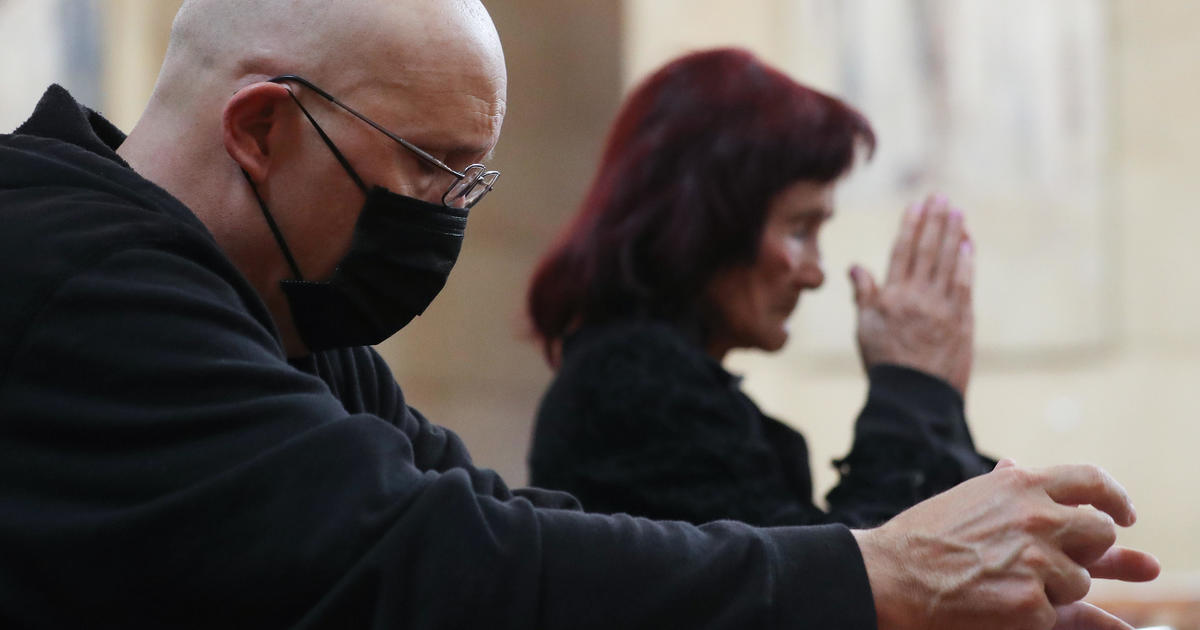Washington — President Trump announced Wednesday night that he's placing Vice President Mike Pence in charge of efforts to tackle the coronavirus, as the administration seeks to reassure the public and the markets amid the global coronavirus outbreak. The president, speaking for only the second time from the White House press briefing room, tried to instill confidence that his administration is on top of the health epidemic.
Speaking to reporters while flanked by Pence, Health and Human Services Secretary Alex Azar, and other officials on his coronavirus task force, the president said the risk to Americans from the virus is "very low," even as the Centers for Disease Control and Prevention (CDC) warns Americans to prepare for disruptions of their normal lives and the spread of the virus is a matter of if, not when. Mr. Trump appeared to disagree with that assessment.
"I don't think it's inevitable. It probably will. It possibly will. It could be at a very small level or it could be at a larger level. Whatever happens, we're totally prepared," the president told reporters.
Minutes after the president ended his press conference, the CDC announced a confirmed case of the virus in California in someone "who reportedly did not have relevant history or exposure to another known patient with COVID-19," the official name for the virus that experts believe originated in China.
Azar is remaining the head of the president's coronavirus task force, but Pence said the administration will add personnel to the White House to address the outbreak, and work closely with Congress to address the situation.
Democrats and some Republicans are suggesting the $2.5 billion in funding the president has requested from Congress isn't enough. Mr. Trump, who said $2.5 billion is a "lot," said his administration is willing to spend "whatever's appropriate" to address the outbreak.
Part of that funding is going towards developing a vaccine, which is still at least 12 to 18 months away, Dr. Andrew Fauci of the National Institutes of Health told reporters. Senators had offered similar estimates after a briefing on Capitol Hill on Tuesday.
"We can't rely on a vaccine over the next several months to a year," Fauci said.
Earlier in the day, Azar said in a congressional briefing that he couldn't guarantee price controls when a vaccine is developed, sparking concerns about affordability even when a vaccine is available to the general public.
The president, when asked, said schools should be preparing for the virus to spread.
Mr. Trump has blamed news outlets and Democrats of stoking panic, as stocks suffered three days of steep losses on fears about the virus' impact. Pelosi criticized the president's response to the virus as underwhelming, and Mr. Trump took the opportunity Wednesday night to hit back at the speaker, calling her incompetent and suggesting she isn't capable of managing her own district.
"She's trying to create a panic, and there's no reason to panic," Mr. Trump said.
Mr. Trump appeared to express confidence in Chinese President Xi Jinping, saying the Chinese leader is working "very hard" to combat the outbreak. The president's own top officials, like economic adviser Larry Kudlow, have expressed they don't think China is being transparent enough with its information, and is blocking U.S. health officials from entering the country.
The president highlighted his administration's efforts to screen people coming from high-risk areas, and temporary ban on non-citizens coming to the U.S. from China. That action, Mr. Trump said, is critical.
"Had I not made a decision very early on not to take people from a certain area, we wouldn't be talking this way," Mr. Trump said. "We'd be talking about many more people being infected. I took a lot of heat. Some people called me racist because I made a decision so early. And we had never done that as a country before, let alone early. So, it was a bold decision. Turned out to be a good decision."
The administration has been inconsistent in its statements about the virus, which started last last year in China. There are now tens of thousands of cases worldwide and a handful in the United States.
The pieces of information about the virus coming from the administration have, at times, been inconsistent.
Kudlow asserted Tuesday on CNBC that "we have contained this ... I won't say airtight, but pretty close to airtight." And Acting Homeland Security Secretary Chad Wolf, was caught making inaccurate statements about the coronavirus during a hearing Tuesday.
On Capitol Hill, Democrats and Republicans alike have expressed frustration with administration officials about inconsistencies in the information they're providing. GOP Senator John Kennedy grew testy with Wolf, who incorrectly stated what the coronavirus mortality rate is, compared to the flu virus. Wolf also testified that the U.S. is "several months" away from a vaccine for the coronavirus, but the CDC said the timeline is closer to 12 to 18 months.
"You're head of Homeland Security, sir. Your job is to keep us safe," Kennedy told Wolf after he couldn't answer how many coronavirus cases are expected in the United States.
https://news.google.com/__i/rss/rd/articles/CBMiiwFodHRwczovL3d3dy5jYnNuZXdzLmNvbS9uZXdzL2Nvcm9uYXZpcnVzLXRydW1wLWNlbnRlcnMtZm9yLWRpc2Vhc2UtY29udHJvbC1uZXdzLWNvbmZlcmVuY2UtdG9uaWdodC02LXBtLXdhdGNoLWxpdmUtc3RyZWFtLXRvZGF5LTIwMjAtMDItMjYv0gGPAWh0dHBzOi8vd3d3LmNic25ld3MuY29tL2FtcC9uZXdzL2Nvcm9uYXZpcnVzLXRydW1wLWNlbnRlcnMtZm9yLWRpc2Vhc2UtY29udHJvbC1uZXdzLWNvbmZlcmVuY2UtdG9uaWdodC02LXBtLXdhdGNoLWxpdmUtc3RyZWFtLXRvZGF5LTIwMjAtMDItMjYv?oc=5
2020-02-27 15:45:00Z
52780630576967
